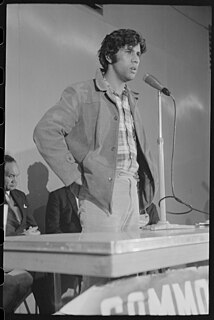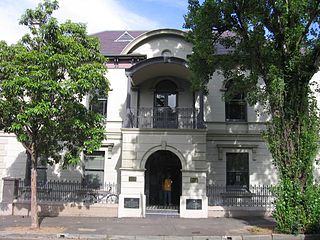Related Research Articles

Mabo v Queensland is a decision of the High Court of Australia, decided on 3 June 1992. It is a landmark case, brought by Eddie Mabo against the State of Queensland. The case is notable for recognising the pre-colonial land interests of First Nations people within Australia's common law. Prior to Mabo, the pre-colonial property rights of First Nations people in Australia were not recognised at common law.

The Aboriginal Tent Embassy is a permanent protest occupation site as a focus for representing the political rights of Aboriginal Australians and Torres Strait Islander people. Established on 26 January 1972, and celebrating its 50th anniversary in 2022, it is the longest continuous protest for Indigenous land rights in the world.

Gary Edward Foley is an Aboriginal Australian activist of the Gumbainggir people, academic, writer and actor. He is best known for his role in establishing the Aboriginal Tent Embassy in Canberra in 1972 and for establishing an Aboriginal Legal Service in Redfern in the 1970s. He also co-wrote and acted in the first Indigenous Australian stage production, Basically Black.

Aboriginal deaths in custody is a political and social issue in Australia. It rose in prominence in the early 1980s, with Aboriginal activists campaigning following the death of 16-year-old John Peter Pat in 1983. Subsequent deaths in custody, considered suspicious by families of the deceased, culminated in the 1987 Royal Commission into Aboriginal Deaths in Custody (RCIADIC).
Charles "Chicka" Dixon was an Australian Aboriginal activist and leader.

Paul Coe, a Wiradjuri man born at Erambie Mission in Cowra, is an Australian Aboriginal activist. His grandfather was Paul Joseph Coe.
The National Black Theatre (NBT) was a theatre company run by a small group of Aboriginal people based in the Sydney suburb of Redfern which operated from 1972 to 1977. The original concept for the theatre grew out of political struggles, especially the land rights demonstrations, which at the time were being organised by the Black Moratorium Committee. The centre held workshops in modern dancing, tribal dancing, writing for theatre, karate and photography, and provided a venue for new Aboriginal drama. It also ran drama classes under Brian Syron, whose students included Jack Davis, Freddie Reynolds, Maureen Watson, Lillian Crombie, and Hyllus Maris.

Redfern Legal Centre (RLC) is an independent, non-profit community legal centre established in 1977 and located in the Sydney inner-city of Redfern, New South Wales. It is part of a network of four inner-Sydney region community legal centres, including the Inner City, Kingsford, and Marrickville Legal Centres. Redfern Legal Centre is a member of Community Legal Centres NSW, the state peak representative body for community legal centres in NSW and also Community Legal Centres Australia, the national peak representative body for community legal centres across Australia.
A community legal centre (CLC) is the Australian term for an independent not-for-profit organisation providing legal aid services, that is, provision of assistance to people who are unable to afford legal representation and access to the court system. They provide legal advice and traditional casework for free, primarily funded by federal, state and local government. Working with clients who are mostly the most disadvantaged and vulnerable people in Australian society, they also work with other agencies to address related problems, including financial, social and health issues. Their functions may include campaigning for law reform and developing community education programs.
Indigenous Australians are both convicted of crimes and imprisoned at a disproportionately higher rate in Australia, as well as being over-represented as victims of crime. As of September 2019, Aboriginal and Torres Strait Islander prisoners represented 28% of the total adult prisoner population, while accounting for 2% of the general adult population. Various explanations have been given for this over-representation, both historical and more recent. Federal and state governments and Indigenous groups have responded with various analyses, programs and measures.
Indigenous land rights in Australia, also known as Aboriginal land rights in Australia, relate to the rights and interests in land of Aboriginal and Torres Strait Islander people in Australia, and the term may also include the struggle for those rights. Connection to the land and waters is vital in Australian Aboriginal culture and to that of Torres Strait Islander people, and there has been a long battle to gain legal and moral recognition of ownership of the lands and waters occupied by the many peoples prior to colonisation of Australia starting in 1788, and the annexation of the Torres Strait Islands by the colony of Queensland in the 1870s.

The Boomalli Aboriginal Artists Cooperative was founded in 1987 in the Sydney suburb of Redfern, New South Wales. Among the legacies of the cooperative are the Deadly Awards for achievement in the Indigenous Australian community, which have occurred annually from 1995 to the present. The 20th anniversary of the cooperative was celebrated in 2007 with an exhibition at the Art Gallery of NSW.
The Aboriginal Legal Service of Western Australia (ALSWA) is an organisation in Western Australia, founded in the early 1970s, that provides legal services to Aboriginal Australians and Torres Strait Islanders. It receives financial grants from the Commonwealth Department of the Australian Attorney General and follows conditions required by that Department. It commenced its Custody Notification Service on 2 October 2019.
Solomon David Bellear was an Aboriginal Australian public figure.

A Custody Notification Service (CNS), sometimes referred to as a Custody Notification Scheme, is a 24-hour legal advice and support telephone hotline for any Indigenous Australian person brought into custody, connecting them with lawyers from the Aboriginal legal service operating in their state or territory. It is intended to reduce the high number of Aboriginal deaths in custody by counteracting the effects of institutional racism. Legislation mandating the police to inform the legal service whenever an Aboriginal or Torres Strait Islander person is brought into custody is seen as essential to ensure compliance and a clear record of events. Where Custody Notification Services have been implemented, there have been reductions in the numbers of Aboriginal deaths in custody.

The Redfern Aboriginal Children's Services, also known as Redfern Aboriginal Children's Services and Archives, or simply Aboriginal Children's Services (ACS), is a community services organisation for Indigenous Australian children in Sydney, Australia.
The Aboriginal Legal Rights Movement (ALRM) is an ATSILS in South Australia, providing pro bono legal services to Aboriginal and Torres Strait Islander peoples in the state. Its headquarters are in Adelaide, with branch offices in Ceduna, Port Augusta and Port Lincoln. It an independent organisation governed by a board of all Aboriginal Australians, which also acts as a lobby group to advocate for justice for Aboriginal people as well as providing programs which aim to address issues which raise the likelihood of Aboriginal people encountering the criminal justice system.
Lyall Munro Jnr, also known as Lyally Mo, is an Aboriginal Australian elder, a former activist and member of many organisations serving Aboriginal Australians. He is known as a local leader in the town of Moree, New South Wales.
References
- ↑ Foley, Gary (16 July 2021). "White Police and Black Power - Part 2". Aboriginal Legal Service (NSW/ACT). Retrieved 2 October 2022.
- ↑ Foley, Gary (5 October 2001). "Black Power in Redern (1968–1972)" (PDF).
- ↑ "1970s | A History of Aboriginal Sydney".
- ↑ Jon Faine (November 1993). Lawyers in the Alice: Aboriginals and whitefellas' law (3 ed.). Sydney: Federation Press. pp. 14–21. ISBN 978-1-86287-115-1.
- ↑ "Aboriginal Legal Service". Dictionary of Sydney . Archived from the original on 2 March 2011. Retrieved 3 June 2020.
- 1 2 "Our History". Aboriginal Legal Service (NSW/ACT) Limited. 1 August 2018. Retrieved 28 August 2020.
- ↑ Pollock, Zoe (2008). "Aboriginal Legal Service". Dictionary of Sydney . Retrieved 28 August 2020.
- ↑ Wootten, J. H. "Aboriginal Legal Service." (1974)
- ↑ Noone, Mary Anne; Tomsen, Stephen (2006), Lawyers in conflict : Australian lawyers and legal aid, Federation Press, ISBN 978-1-86287-616-3
- ↑ Jon Faine (November 1993). Lawyers in the Alice: Aboriginals and whitefellas' law (3 ed.). Sydney: Federation Press. pp. 14–21. ISBN 978-1-86287-115-1.
- ↑ Potter Jr, Charles E. (1973). "Poverty law practice: The Aboriginal Legal Service in New South Wales" (PDF). Sydney Law Review (7): 237–256.
- ↑ "What is the Custody Notification Service?". Aboriginal Legal Service (NSW/ACT) Limited. 1 August 2018. Retrieved 13 June 2020.
- 1 2 Higgins, Isabella (11 October 2017). "States urged to back 'life-saving' policy to prevent Indigenous deaths in custody". ABC News . Archived from the original on 8 April 2018. Retrieved 18 May 2018.
- ↑ Wahlquist, Calla (9 March 2017). "Indigenous groups criticise Liberals and Labor in WA over custody policies". The Guardian . Archived from the original on 8 April 2018. Retrieved 18 May 2018.
- ↑ Fryer, Brooke (15 October 2019). "NSW changes protocols in attempts to help further protect Indigenous people in police custody". NITV. Retrieved 29 August 2020.
- ↑ "Custody Notification Service". Australian Government. Australian Law Reform Commission. 19 July 2017. Retrieved 13 June 2020.
- ↑ Marks, Russell (14 June 2019). "Custody battle". Inside Story. Retrieved 6 August 2019.